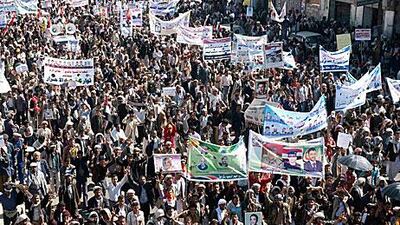SANAA // Tens of thousands protested in Sanaa, Taiz and other cities, demanding the outgoing president, Ali Abdullah Saleh, be prosecuted for the killings of more than 1,100 people, including three yesterday, since the uprising against him began a year ago.
On Saturday, an aide to Mr Saleh said the president had reversed a decision to leave the country for medical treatment while the new government was taking shape.
In November, Mr Saleh agreed to step down after 33 years in power in exchange for immunity from prosecution for him and his inner circle.
"It is not possible in any way, shape or form to allow the collapse of state establishments and institutions that have been built over the last 49 years," Mr Saleh had said about the strikes and protests sweeping state institutions demanding the dismissal of officials on corruption charges.
Yesterday, a Yemeni opposition leader said Mr Saleh's change of mind about leaving the country was indicative of his "slippery tactics" and bid to retain power.
"His end should be behind the bars at the International Criminal Court," said Mohammed Al Sabri, a leader in the Joint Meeting Parties, an opposition coalition.
Sami Hadi, a protester in Sanaa, echoed those sentiments. "We are demanding that this mass killer should not be allowed to escape the country. We want justice for our colleagues who were killed by the family troops," he said yesterday.
Ahmed Al Zurkah, an analyst and freelance writer, said Mr Saleh's flip-flop on leaving the country was about maintaining influence.
"This is a part of his strategy based on slippery tactics. It has something to do with his worries that he might be trapped if he goes to the US not as a president," said Mr Al Zurkah. "Saleh's people at the state agencies have been alarmed by the current strikes and uprisings that will push them out."
Other critics have said that Mr Saleh has been using his influence over the army and security forces, in which his relatives maintain power, and loyalists in his political party to undermine the vice president, Abdurabu Mansur Hadi, who is taking over from him ahead of presidential elections next month in which Mr Hadi will be the only candidate.
Under the terms of the transition agreement, Mr Saleh handed over all his authority to Mr Hadi and committed to step down formally once parliament granted him immunity from prosecution.
But Sultan Al Barakani, the assistant secretary of the ruling General Peoples Congress, said yesterday that his party would not take part in the presidential vote as long as "provoking acts" continue.
Tribal chief Sheik Mohammed Al Shayef, who is also a leading member of the People's Congress Party, told the Associated Press that Mr Saleh had decided to remain in the country because of the unrest, which he blamed on the opposition.
"Dangerous developments have led to this decision" to stay, Mr Al Shayef said. "It is in the interest of Yemen that Saleh remains in here."
Mr Hadi met for the second time with the unity governmen yesterday.
"The international community is constantly following up what we are doing here in Yemen ... There is no option but to succeed and overcome the challenges," he said.
* With additional reporting by the Associated Press

